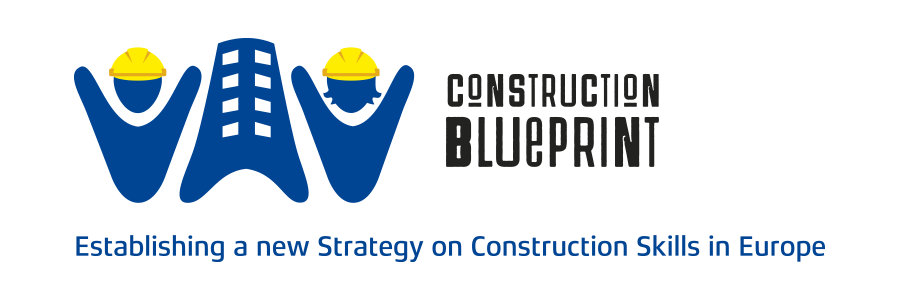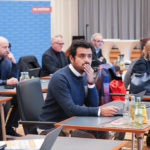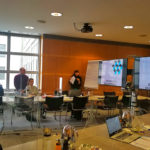The sixth meeting of the Construction Blueprint project, co-funded by the European Union’s Erasmus+ programme, was held on 13 and 14 October at the Berlin headquarters of the Zentralverband des Deutschen Baugewerbes (ZDB).
Fundación Laboral de la Construcción, coordinator of the initiative, organised, together with the German partners (ZDB, BZB y BFW-NRW), a hybrid meeting, held both in person and online, to ensure the attendance of the consortium members that could not travel to Berlin due to the Covid-19 pandemic. This allowed them to discuss together the latest advances of the project regarding the identification of the competence needs of the sector and the professional profiles most demanded by companies, as well as the definition of training strategies.
During the first day, the e-learning platform, developed by the Limerick Institute of Technology (LIT), which compiles several digital courses focusing on energy efficiency, digitisation and circular economy, was presented and the global launch date was discussed. In addition, the conclusions drawn from last summer’s survey on the skills needs of European companies in the sector were shared.
Together with these results, the creation of an Observatory to anticipate the needs of companies and workers for knowledge in aspects of energy efficiency, circular economy and digitalisation, at national and European level; and the elaboration of a report where sectoral occupational profiles are identified and analysed at EU level and in each of the countries of the consortium were discussed.
Finally, the latest progress achieved by the Sector Skills Alliance was presented. The work was led by Fiec‘s European partners EFBWW and EBC, and coordinated by Fundación Laboral de la Construcción. The Alliance consists of a forum where key actors from the construction industry and education can interact, discuss the current situation and the future of skills in the construction sector and exchange good practices at European and national level.
Workshops for the design of training curricula
On the second day of the meeting, the partners were divided into working groups (both online and face-to-face) to review and discuss the model training curricula designed by LIT. These programmes, aimed at vocational students and workers in the sector, aim to provide the necessary skills in terms of energy efficiency, circular economy, and digitalisation to users, in order to face the challenges of the sector in the short and medium term.
The programmes will be composed of different training modules that will be tested in the project’s training centres during 2022, in which at least 600 students are expected to participate.











